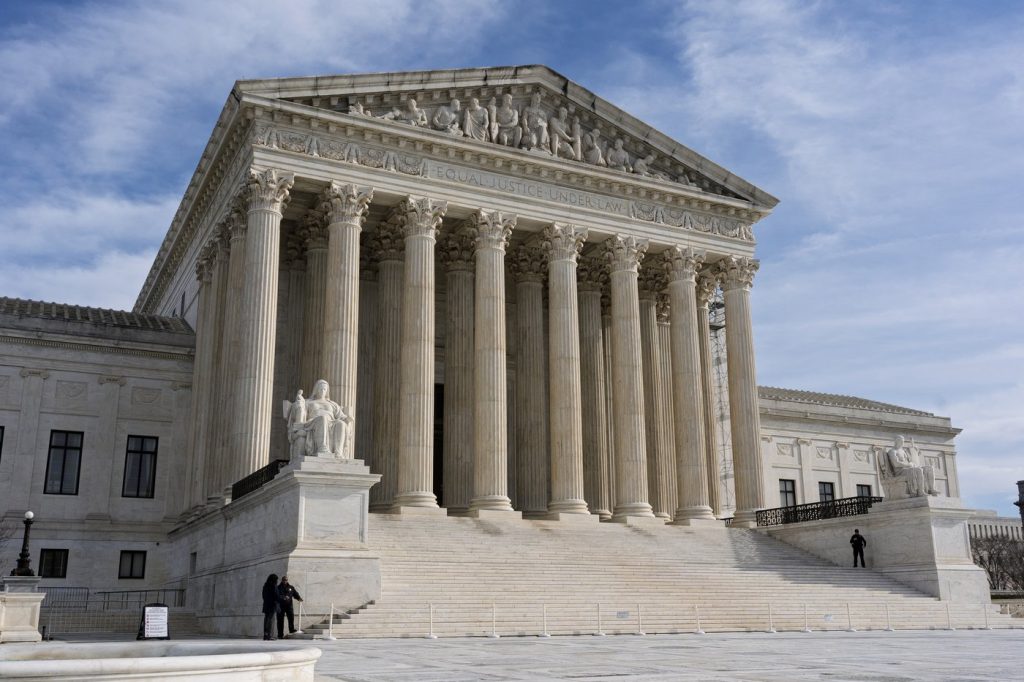WASHINGTON (AP) — The Catholic Church in Oklahoma is advocating for taxpayer funding of St. Isidore of Seville Catholic Virtual School, an online charter school that aims to adhere to the teachings of Jesus Christ. This initiative could potentially be approved by the Supreme Court, setting a precedent for the establishment of the nation’s first religious charter school.
The implications of such a ruling could significantly blur the lines between church and state, draw funds away from public schools, and disrupt the current regulations governing charter schools across various states. The Supreme Court is scheduled to hear arguments on this high-stakes case, one of the term’s most watched, on Wednesday.
This case arrives amid a surge in initiatives, primarily from conservative-led states, seeking to incorporate religious elements into public education. Examples of these initiatives include a contested requirement in Louisiana mandating the display of the Ten Commandments in classrooms and an Oklahoma directive by the state’s schools superintendent to place Bibles in public school classrooms.
In recent years, conservative justices on the high court have issued several rulings permitting public funds to flow towards religious institutions. This trend has caused concern among liberal justices, including Justice Sonia Sotomayor, who has expressed dismay at what she perceives as a dismantling of the separation between church and state established by the Framers of the Constitution.
The Supreme Court is currently reviewing a ruling by the Oklahoma Supreme Court, which invalidated the approval of the charter school's application by a state board. The board’s decision came under scrutiny for potentially violating the First Amendment's Establishment Clause, which prohibits the government from enacting laws that respect the establishment of a religion.
Proponents of the charter school argue that the Oklahoma court's decision infringes upon the religious freedom protected by the First Amendment’s Free Exercise Clause. This clause has underpinned several recent Supreme Court decisions favoring religious institutions. Chief Justice John Roberts articulated in a 2020 ruling that while a state is not obligated to subsidize private education, once it chooses to do so, it cannot discriminate against religious schools.
The situation has created a divide among Oklahoma's Republican leaders. Governor Kevin Stitt and State Superintendent of Public Instruction Ryan Walters support the usage of public funds for religious schools, while Attorney General Gentner Drummond opposes this initiative and has challenged the charter school's board decision in court.
A critical question in this case is whether the charter school is considered public or private. In Oklahoma, charter schools are viewed as public entities, alongside 45 other states and the District of Columbia where they operate. With approximately 4 million children, or about 8% of American schoolchildren, enrolled in charter schools, their classification matters significantly.
Lawyers for Attorney General Drummond argue in a Supreme Court filing that charter schools exhibit all the characteristics of public schools, including receiving state funding, adhering to antidiscrimination laws, and complying with curriculum and testing oversight. However, they are also governed by independent boards that are separate from local public school systems.
Nicole Garnett, a law professor at the University of Notre Dame and a proponent of funding religious charter schools, argues that charter schools, while labeled public, function differently from traditional public schools.
If the court concludes that St. Isidore is a public entity, it could lead to a ruling that goes against the charter school. Conversely, if deemed a private institution, the court may lean toward past decisions that have sided with religious organizations facing discrimination.
The Supreme Court's willingness to consider this case could indicate a majority inclination toward supporting St. Isidore. Notably, a previous decision by the Oklahoma court is the only one to address the issue of religious charter schools, and currently, only eight justices are participating in the hearings, as Justice Amy Coney Barrett has recused herself.
Justice Barrett previously taught law at Notre Dame and has close ties to Garnett. The current Supreme Court features justices who are well-acquainted with both private education and religious institutions, with six having attended Catholic schools, and many of the justices' children currently or previously enrolled in private schools.
Walters perceives this case as a pivotal moment for educational choice, espousing the idea that parents should have the autonomy to select the educational path for their children, whether it be a religious institution, charter school, or public school. He has been vocal in his critique of the separation of church and state while advocating for more religion within public educational frameworks.
On the opposing side, Rachel Laser, president of Americans United for Separation of Church and State, asserts that utilizing public funds for religious education represents a stark violation of constitutional principles. She argues that such funding compels taxpayers to support religious instruction that does not align with their beliefs.
Opponents like Erika Wright, an Oklahoma mother, fear that the establishment of religious charter schools could siphon funds from already limited rural public schools, potentially detrimentally affecting educational resources statewide. As the legal proceedings unfold, a decision from the Supreme Court is anticipated by early summer.











